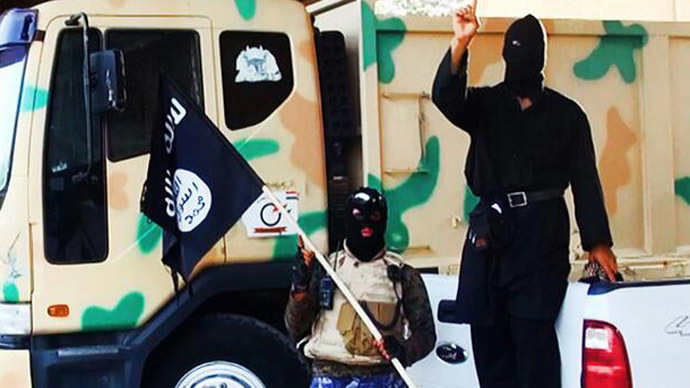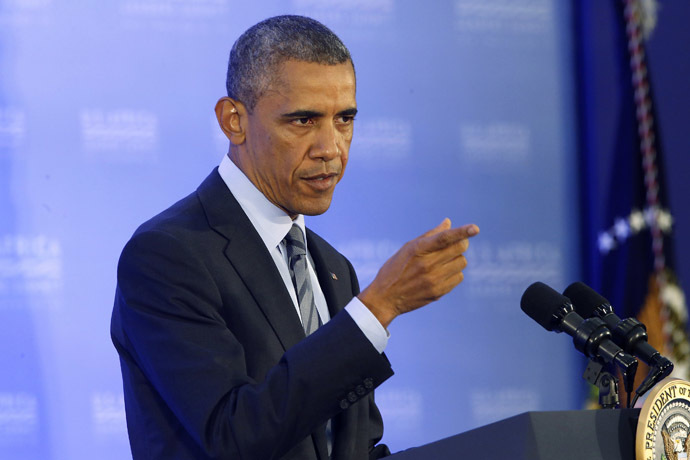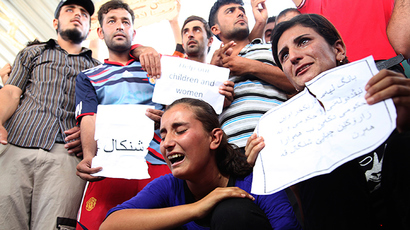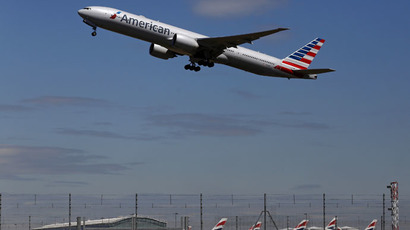Obama on solving Iraq crisis: 'It will take some time'

US President Barack Obama has stated that ending the crisis in Iraq may “take some time,” and it will be more than a few weeks.
"I don't think we're going to solve this problem in weeks. This is going to take some time," Obama said during a news conference in Washington. The president also stressed the urgent need to form the inclusive Iraqi government “right now.”
“This is a wake-up call for a lot of Iraqis inside of Baghdad recognizing that we're going to have to rethink how we do business if we're going to hold our country together,” he added. However, Obama denied all allegations that the US is going to engage in a long-term conflict.
It comes a day after the American leader authorized airstrikes against members from the terrorist group Islamic State in northern Iraq.
On Friday, Obama sat down to an interview with New York Times columnist, Thomas Friedman, where he spelled out his thoughts on the situation in Iraq – and beyond.
READ MORE: US jets conduct new round of airstrikes in Iraq
While expressing America’s unwillingness to become “the Iraqi
air force,” Obama, at the same time, said he would not let
the Islamic State “create some caliphate through Syria and
Iraq."
“We can run [ISIL] off for a certain period of time, but as
soon as our planes are gone, they’re coming right back in.”
He then admonished the leaders of Iraq, telling them they must
find ways of keeping their country unified in the fight against
the militants; otherwise more American boots on the ground in
Iraq will not solve the problems.
“We will be your partners, but we are not going to do it for
you,” Obama advised. “We’re not sending a bunch of US
troops back on the ground to keep a lid on things.
“We cannot do for them what they are unwilling to do for
themselves,” he added.

Obama said that was part of the reason that the US military did
not conduct airstrikes against fighters of the Islamic State
sooner.
“We did not just start taking a bunch of airstrikes all
across Iraq as soon as ISIL came in… because that would have
taken the pressure off of [Prime Minister Nuri Kamal]
al-Maliki.” An American bombardment on the militants would
have encouraged Maliki and other Shiites to think: “‘We don’t
actually have to make compromises. We don’t have to make any
decisions. We don’t have to go through the difficult process of
figuring out what we’ve done wrong in the past. All we have to do
is let the Americans bail us out again. And we can go about
business as usual.’”
“You’re going to have to show us that you are willing and ready to try and maintain a unified Iraqi government that is based on compromise,” he emphasized.
Obama then pointed to the Kurdish tribes that populate the north
of Iraq, saying, “the Kurdish region is functional the way we
would like to see. It is tolerant of other sects and other
religions in a way that we would like to see elsewhere.”
Although the Bush administration is responsible for making the
fateful decision to attack Iraq in March 2003 on the flimsy
argument that the Ba’athist regime was hoarding weapons of mass
destruction, it was Barack Obama who was elected to pick up the
pieces and make Iraq a somewhat functional country again. It has
been a largely thankless task, filled with more setbacks than
successes. Today, many critics say the US military under Obama
pulled out too soon, leaving the country a basket case of
violence, chaos and corruption.
“This is the education of Barack Obama, but it’s coming at a
very high cost to the Syrian people to the Iraqi people [and] to
the American national interest,” Doug Feith, a top Pentagon
official during the Bush administration, told Politico in June.
“The president didn’t take seriously the warnings of what
would happen if we withdrew and he liked the political benefits
of being able to say that we’re completely out.”
Unfortunately, the Bush administration also did not take
seriously the threat of getting itself involved militarily in the
first place in Iraq, which has suffered millions of casualties
since US forces rashly opened a military offensive there over a
decade ago.
But now the dilemma of a fractured Iraqi state, together with
militant rebels threatening the creation of a caliphate, are very
much Obama’s problems now.














